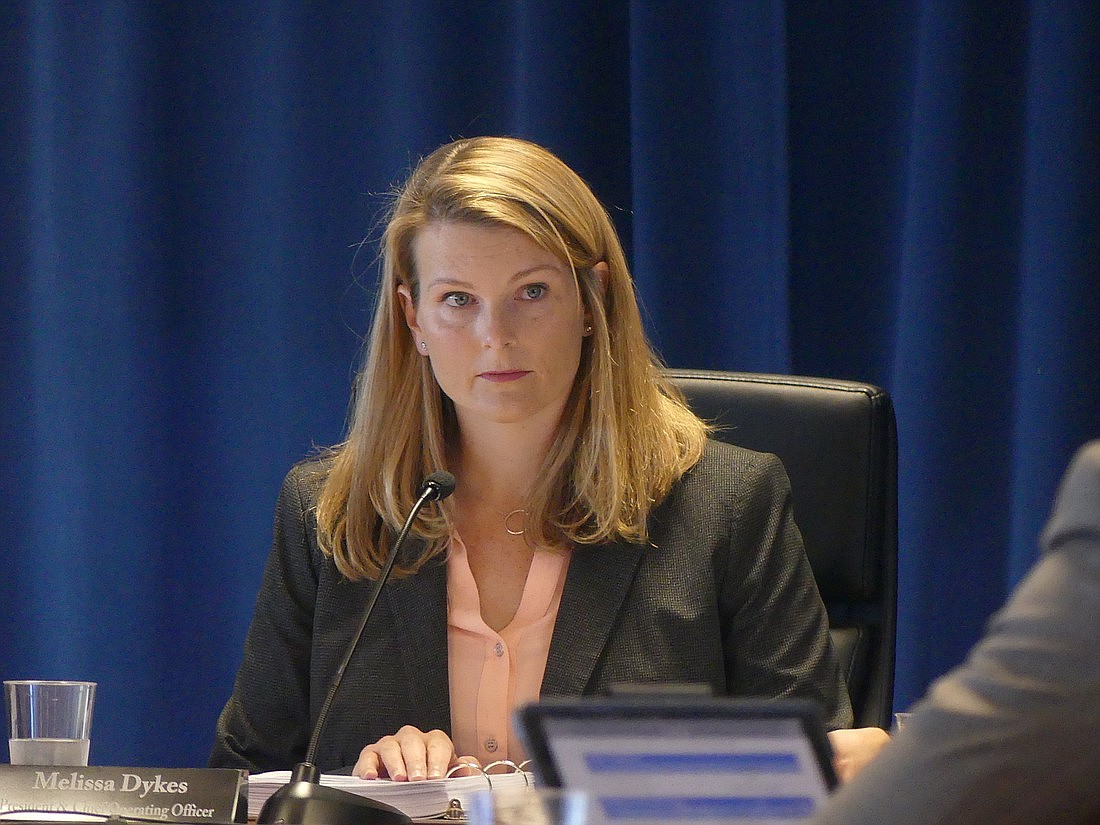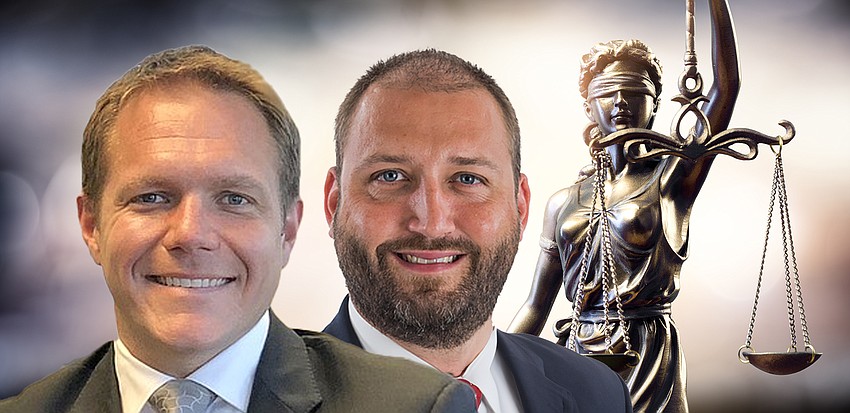
JEA’s former chief operating officer testified that she knew an incentive plan developed under JEA executives Aaron Zahn and Ryan Wannemacher would deliver highly lucrative payouts through a sale of the city-owned utility.
Testifying Feb. 29 in the criminal trial of fired JEA Managing Director and CEO Zahn and CFO Wannemacher, Melissa Dykes said she believed the plan stood no chance of being approved by the JEA board given the magnitude of the payouts.
When the board voted in favor of the plan July 23, 2019, she said she was “very surprised.” The same day, the board voted to initiate a process to potentially sell the utility.
“I thought I understood the calculations … and my expectation going into that meeting was they would not approve it,” said Dykes, who also testified that she believed Zahn had given board members a full explanation of the plan before the meeting.

Prosecutors allege that Zahn and Wannemacher duped JEA board members into believing the plan’s payouts would be modest when, in fact, the two stood to reap tens of millions of dollars through a sale of JEA. The government also contends that Zahn and Wannemacher falsely portrayed JEA as a failing business that could only be salvaged through a sale.
Dykes’ statements came on the heels of testimony by former JEA board members that they believed the plan would have paid out a maximum of $3 million to $4 million across all plan participants. The board members further testified that they would not have approved the plan in light of a November 2019 report from the City Council Auditor’s Office that the payouts could be hundreds of millions of dollars if JEA sold.
The bonus plan involved offering JEA’s 2,000-plus workers “performance units” similar to stocks in a private company. The units were to be sold at $10 apiece, with their value designed to increase or decrease based on JEA’s financial performance.
Rewards for the 'sacrifice'
Answering a question from Assistant U.S. Attorney Tysen Duva, Dykes testified that Wannemacher told her that the purpose of the plan was to provide rewards for making the “sacrifice of going through a sales process.”
She also testified that Zahn told her he hoped to become chairman of the board of JEA after a sale but would recommend her for the CEO position. She described the comment as “almost like throwing a bone” to her.
“Like, stick around and do this (implement the plan and effect the sale), and you’ll be CEO after this,” she said.
Dykes said rewards for sales are common in the private sector but “are just not seen” in public, not-for-profit organizations like JEA. She said previous attempts at adopting incentive plans were politically unpopular and had left her with “battle scars.”
Asked by Duva whether she could have “made a lot of money” under the plan, she replied: “Theoretically. I just didn’t think this plan was ever going to happen.”
Zahn and JEA’s executive team announced days before the Council Auditor’s report that they were indefinitely postponing implementation of the plan. In December 2019, the board rescinded the plan and halted the potential sale of JEA.
In early 2020, Zahn and Wannemacher were fired.
Curry wanted her out
In other testimony, Dykes testified that Mayor Lenny Curry told former board member Alan Howard that he wanted her out as interim CEO in 2018.
Dykes had been chosen for the interim role on April 6, 2018, when former CEO Paul McElroy resigned.

She told jurors a short time later, Curry summoned her to his office at City Hall for a conversation about the direction of JEA. After what she described as a “very short” meeting with Curry, she had a conversation with Howard.
“He said the mayor provided him feedback that I was not impressive and he wanted to go in a different direction,” she said.
On April 17, 2019, which was 11 days after Dykes’ appointment to the interim position, the board replaced her with Zahn.
Zahn, who had been appointed to the JEA board in February 2018 by Curry, resigned from his seat on the board to seek the interim CEO position.
Dykes agreed to serve as COO, a role in which she oversaw day-to-day operations of the utility. In that role, she worked closely with Zahn and Wannemacher. Having served as CFO for several years before she was named to the interim role, Dykes said staying at JEA was a difficult choice.
“I stayed because I believed in my team,” she testified. “I stayed because I believed in JEA and what we were doing. It wasn’t easy.”
Several 'circuit breakers'
Under questioning from Eddie Suarez, an attorney for Zahn, Dykes testified that JEA’s chief administrative officer, Herschel Vinyard, had established several “circuit breakers” to ensure the incentive plan was legal before it was implemented.
Among them, the plan was to be reviewed by the state attorney general’s office and the state ethics office. The defense also has noted that a sale of JEA would require approval by the JEA board, Council and Jacksonville voters via a referendum.
“Everyone knew — the management at JEA — that this was going to be highly scrutinized and that’s why they wanted to make sure it was done absolutely by the book, right?” Suarez asked.
“Yes,” Dykes said.
Under cross-examination by Jim Felman, an attorney representing Wannemacher, she described the defendant as being “one of the most honest people I know.” Dykes had known Wannemacher for several years before she joined JEA, and she encouraged him to join the utility’s executive team.
“He has always striven to do exactly what’s right, in every part of his life,” she said.
Curry mentions
Her testimony about Curry was among several mentions of the former mayor during the trial since it began Feb. 15 with jury selection.
Former JEA CEO McElroy testified that he stepped down April 6, 2019, after Howard told him in early 2018 that Curry was not happy with him and that “things could be made very difficult for you” if he remained at JEA.
Earlier in the day, public access to the trial was cut off for about an hour when Senior U.S. District Judge Brian Davis ordered a closed procedural hearing.
The hearing focused on what are known as the Garrity rights of Zahn and Wannemacher. Those rights protect public employees from self-incrimination when they’re compelled to testify.
Attorneys for Zahn and Wannemacher have argued that the government’s case involves information that the two defendants were compelled to provide to city investigators during 2019 and 2020 as the city and JEA tried to determine whether Zahn could be fired with cause.
The closed hearing focused on a government witness, utility analyst Jeff Panger from S&P Global, who raised concerns about JEA financial projections that helped prompt a JEA board vote July 23, 2019, to explore a possible sale of the utility.
Jennifer Mansfield, an attorney representing The Florida Times-Union and First Coast News, told Davis after the hearing that her clients objected to the proceeding being closed “after the juries had already been seated” in the trial.
Davis told Mansfield that the closure ruling “can’t be undone” but that he would welcome an after-the-fact objection in writing.
Mansfield said she entered the objection because “we anticipate this is an issue that’s going to come up again.”
The trial, which is being held at the Bryan Simpson U.S. Courthouse, is scheduled to resume at 9 a.m. March 1 with ongoing cross-examination of Dykes.